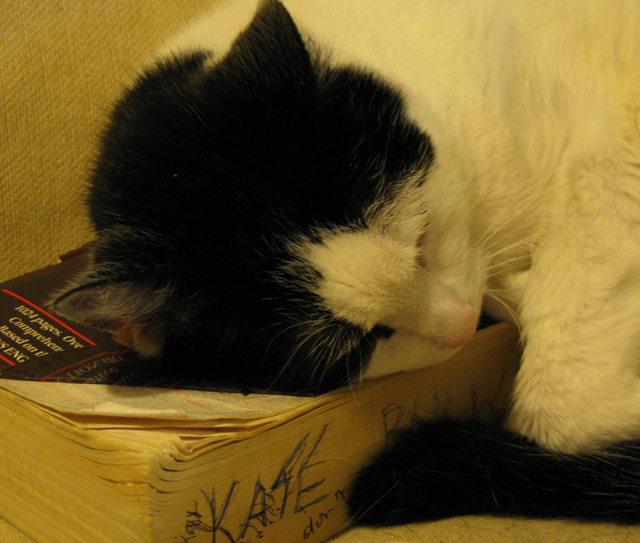 (image by Kate Bailward)
(image by Kate Bailward)
Dictionaries are wonderful things. I love them. My Collins English dictionary has served me very well over the years, although it’s pretty battered now. Unfortunately I don’t have it with me in Italy, as it was too heavy to pack, so I can’t check the frontispiece for the publishing date. However, it was given to me at prep school by my headmaster, so it’s a good 20-25 years old. As it’s a good-quality dictionary, it’s stood the test of time, and is as useful today as it was back in the mid-80s. Likewise my frickin’ enormous English-French/French-English dictionary (which I’m pretty sure is also published by Collins). It’s the size of an encyclopaedia, but the contents are as sound today as they were 20 years ago, and it’s never let me down.
Sadly, I must report that Garzanti Italian-English/English-Italian dictionaries are nothing like so reliable. The other day, in class, one of my students didn’t know the meaning of ‘hope’, so looked it up in her dictionary. Not only did it not have a definition for ‘hope’, but the entire entry for ‘H’ consisted of one paragraph. ONE PARAGRAPH. If you looked up ‘sperare’ then the correct definition was given, but that’s not much good when you’re trying to go from English to Italian.
I have found, generally, that the dictionaries my students have are pretty inferior quality, which is frustrating. They’re all hell-bent on looking words up rather than trying to work them out from context, or allowing me to explain (which is also frustrating – but that’s a rant for another day). However, far too much of the time the definitions that are given are either misleading or downright wrong. A particularly amusing example of this came up the other day. I had taught a lesson on comparatives (e.g. better, colder, taller) and superlatives (the best, the coldest, the tallest etc). I then sent the students away with, among other things, a gapfill exercise to complete for homework. This consisted of an email written by a boy on holiday in Australia, comparing it to England. One of the words that needed to be inserted into the text was ‘hotter’. (Really? You don’t say!) This had been mentioned in class, but clearly hadn’t sunk in, as one of the students didn’t know what it meant in the context of the exercise. On looking in her dictionary for help, she found that, apparently, ‘hotter’ means ‘young male criminal’. Yes, I was as flabbergasted as you are! Luckily, the student had enough sense to work out that this wasn’t correct, and found it very funny, but it’s somewhat worrying that dictionaries are being published that are so far wide of the mark. I can’t even begin to think what it was that the dictionary’s publishers were trying to translate. The mind boggles. On the plus side, it did lead to an amusing sidetrack into ‘hot-wiring’ and various words to do with criminal activity, though. I do like to teach my kids the really important things in life.
On the other side of the coin, I’ve spent this morning giving myself Italian lessons, which has also led to some confusion. Never let it be said that I don’t know what my students are going through. I use a site called LiveMocha, which I think is great. It’s all based on peer correction, with each student submitting their exercises to the site for correction by other students. I like the happy-clappy shariness of it, and it means that I’m being corrected by native Italian speakers, which is the best way, really.
I am doing the beginner’s course, so the sentences are as basic as can be. The first stage of the lesson consists of reading sentences matched to pictures. So, for instance, a picture of a yellow flower is accompanied by the phrase, ‘Il fiore è giallo.’ A little further on, I was shown a picture of a silver coin and given the phrase, ‘la moneta è d’argento’. I was then shown a picture of a silver car and given the phrase, ‘l’automobile è grigia metallizzata’. Meh. Pot-AY-to/pot-AH-to. In the consolidation exercise that followed, I decided to be a rebel and say that the car was silver, not metallic grey. However, the system told me that was wrong. Bah! Eventually, I worked out that d’argento means, literally, made of silver, but it’s easy to see how confusion sets in.
Oh, if anyone’s interested, I should have said, ‘l’automobile è argentata’, apparently. Bloody Italian word endings.
Words
This entry was posted in Teaching Like a Maniac and tagged english, italian, language. Bookmark the permalink.







10 Responses to Words